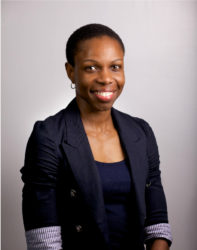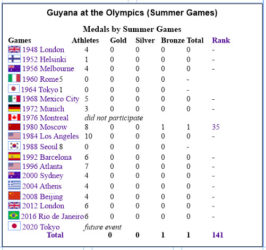Want to win an Olympic medal? Start long-term planning now.
That is the opinion of Guyana’s most decorated athlete Aliann Pompey.
“There really isn’t a simple answer to what it’ll take to win a medal,” said Guyana’s most decorated female athlete when contacted by Stabroek Sports for her views on what it would take for Guyana to win her second Olympic medal.
“For certain, it’ll take long term planning,” she added.

Pompey was for a long time the Golden Girl of Guyana’s athletics. She represented Guyana at four Olympic Games, five World Championships and won a gold medal at the 2002 Commonwealth Games in Manchester, England and a silver medal at the 2010 Commonwealth Games in New Delhi, India.
She also won a bronze medal at the 2003 Pan Am games in Santo Domingo and a silver medal at the Central American and Caribbean games in 2010 in her stellar career.
Identifying talent
Pompey feels that identifying talent and ensuring that they benefit from the necessary training and exposure.
“In 2008 and prior, Canada had identified some of the athletes for their 2016 podium project. DeGrasse (Andre) was on their radar since then. Eight years out, other countries are planning where to spend their resources, and four years out narrowing down the strategy,” explained Pompey.
“Allowances are made for the athletes who step up beyond what was expected. Raising the level of expectation and support is key,” she added.
Funding, key

After only moderate returns in the pre-Atlanta Games era, it decided to start allocating significant revenue to elite Olympic sport.
Before the Atlanta Olympic Games in 1996, Britain sport received five million pounds per year.
By the 2000 Olympic Games in Sydney, Australia, the figure had jumped to 54 million pounds.
In 2012, when the Olympic Games were held in Manchester, the sum of 264 million pounds was allocated and for the 2013 and 2017 period, almost 330 million pounds have been earmarked for Olympic and Paralympic sports.
The results are worth noting.
In 1996, Britain won 15 medals, one gold, eight silver and six bronze.
In 2000, they won 28 medals, 11 gold, 10 silver and seven bronze.
In 2004, they won 30 medals, nine gold, nine silver and 12 bronze.
In 2008, the tally was 47 medals, 19 gold, 13 silver and 15 bronze.
In 2012, the tally moved to 67 medals, 29 of which were gold, 17 silver and 19 bronze while at last year’s Olympic Games in Rio de Janeiro, Brazil, Britain took home 67 medals, 27 gold, 23 silver and 17 bronze.
While there might have been other factors responsible for the increase in medals, it would be safe to say that increased government funding was one of those reasons.
GOA criticisms
Pompey also weighed in on the recent criticisms of the Guyana Olympic Association and the Athletics Association of Guyana for the fact that this country has not won another Olympic medal 37 years after Michael Parris won a bronze medal at the 1980 Olympic Games in Russia.
To date Parris’ medal is the only one won by Guyana since the inception of the modern Olympic Games.
“I’m asked a lot about the GOA criticisms and I have made no comments about it, particularly as it pertains to athletics because, before all else, the athletics association was the first to fail their athletes.
“The AAG is the steward of athletics. There have been complaints about competitions being disorganized and untimely, qualification standards and time periods being unclear, athletes and coaches diligently preparing for the season while international entry deadlines aren’t being adhered to – thus creating a situation where athletes do not get the necessary international exposure to excel at a high level, lack of transparency – it all leads to us being where we are,” she declared.
“The people with the know-how are there. The people willing to do the work are there. The talent is definitely there. The leadership is not. The structure isn’t there. The long or short-term plan isn’t there. The desire to strategize, to create incentives to keep the right people in the sport – absent. The culture that’s been fostered isn’t conducive to success. If we continue down this path, we won’t win a paper medal.”
Pompey, who last year held an international meet the Aliann Pompey International (API) at the National Stadium at Leonora said she plans to stage the second meet this year.
“The second edition of the API will be held on July 15th. It looks to be even bigger and better than last year. Planning is already underway. It’s still fairly early in the planning, but as the details become available, I will let you know the confirmed athletes and sponsors.”




